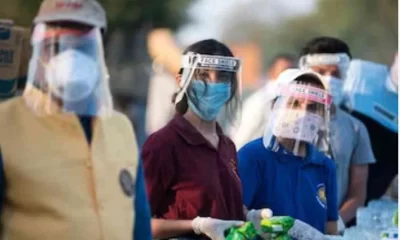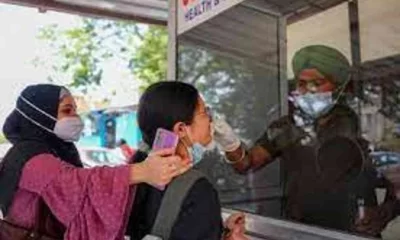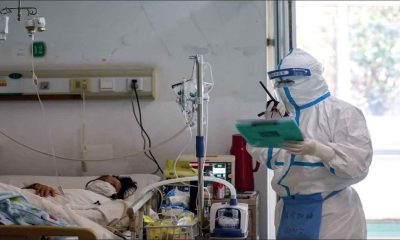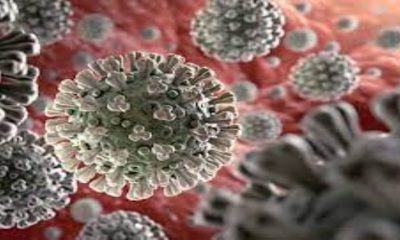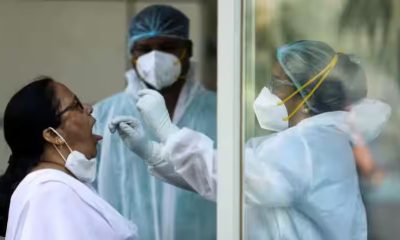Health
Precaution vaccine doses to start in India; Check date, eligibility criteria and how to register
Amidst the ongoing pandemic, India will begin the precautionary booster dose of Covid-19 vaccine from tomorrow, January 2, 2022.

Booster doses of vaccine have become normal in various country following the surge of Covid-19 cases. Amidst the ongoing pandemic, India will also begin the precautionary booster dose of Covid-19 vaccine from tomorrow, January 10, 2022.
Who all will be eligible for booster vaccine doses?
Healthcare workers, frontline workers and senior citizens above the age of 60 with co-morbidities are eligible to register for the precaution booster vaccine dose. The citizens who have taken 2 doses of vaccine and have finished 39 weeks (9 months) after the second dose are eligible to take the booster dose.
Normal civilians can also register for these booster shots in case they have any co-morbidities. These co-morbidities include diabetes, cardiovascular disease, cancer, kidney disease, cirrhosis, stem cell transplant, sickle cell disease and other conditions.
How to register?
The registration for Covid-19 booster dose has already begun from January 8, 2022. Those who are eligible can register on the CoWIN portal.
For advance registration, beneficiaries can register through the CoWIN facilitated Cohort Registration Facility.
The slots will be allotted on the basis of the date of the second dose of Covid-19 vaccine.
For verification, Aadhaar will be used. Ministry of Health and Family Welfare has also approved EPIC, passport, driving license, PAN card, Smart Card (issued by RGI under NPR) and Pension document (with photograph) for verification.
The Co-WIN system will send an SMS to those who register. Citizens can register and get an appointment both online and onsite.
Those who are eligible can also get a walk-in appointment from any vaccination centre.
No mixing of vaccine shots
According to the Centre’s guidelines, no mixing of shots will take place. If a person has been administered to Covishield for the first two doses, then s/he will get a booster shot of Covishield. The same goes for Covaxin.
Why are booster doses important?
New variants of Covid-19 may have increased the risk of the co-morbid population getting infected again. The booster shot will only enhance protection against Covid-19, but also maintain immune protection and prevent medical complications.
Health
India registers 313 new Covid cases, active cases reach 2,041, 3 deaths recorded in last 24 hours
The currently available data suggests that the JN.1 variant is neither leading to an exponential rise in the new cases nor a rise in the hospitalization and mortality.
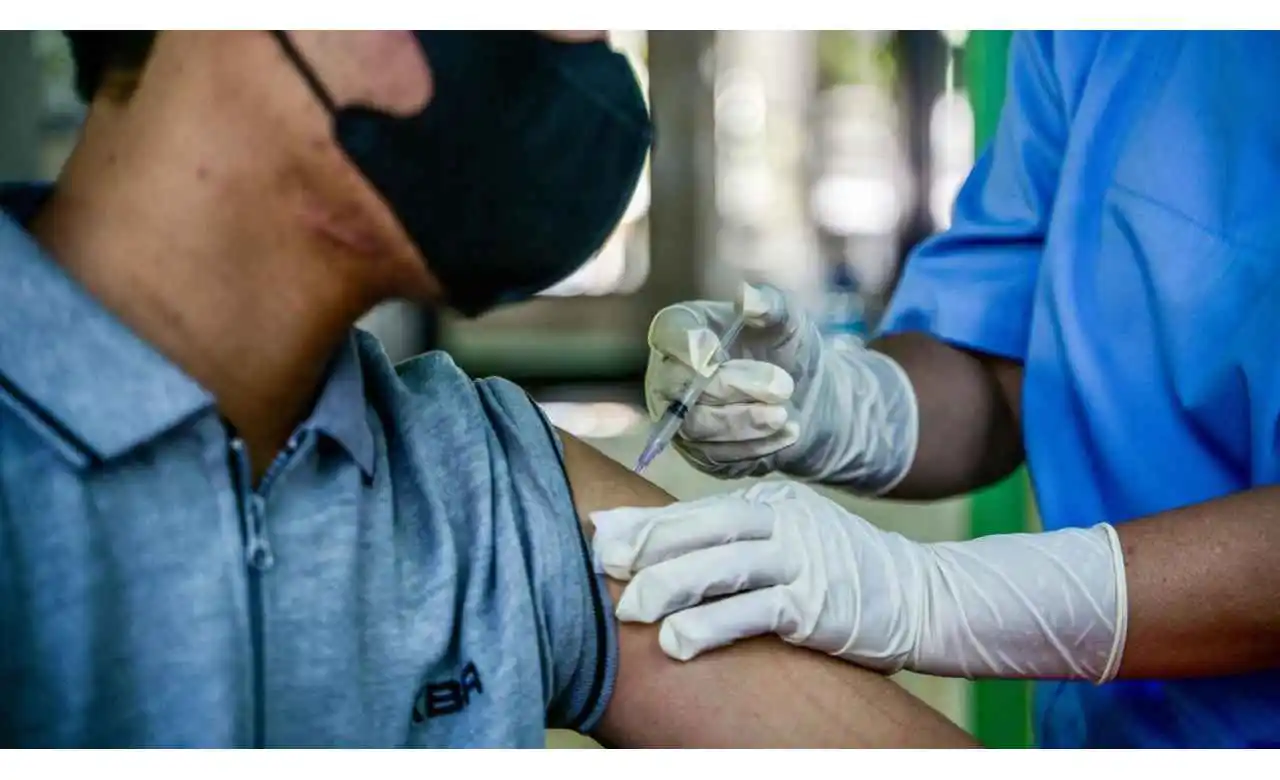
India saw a single-day rise of 313 new Covid cases, while the active caseload has declined to 2,041, the health ministry said on Saturday. Three deaths: two from Karnataka and one from Maharashtra were reported in the last 24 hours.
According to the ministry website, the number of active cases in the country stood at 2,331 on Friday. The number of cases of Covid had dropped to double digits till December 5, but it began to start increasing after the emergence of a new variant and cold weather conditions.
According to reports after December 5, the highest single day rise of 841new cases was reported on December 31, 2023, which is 0.2% of the peak cases reported in May 2021. Of the total active cases, a large majority of these (around 92%) are recovering under home isolation.
The currently available data suggests that the JN.1 variant is neither leading to an exponential rise in the new cases nor a rise in the hospitalization and mortality. India has witnessed three waves of Covid in the past with its peak incidence of daily new cases and deaths being reported during the delta wave in April June 2021.
At its peak, 414,188 new cases and 3915 deaths were reported on May 7, 2021. Since the pandemic started in early 2020, there have have been 4.5 crore people who have got infected and this has resulted in the death of 5.3 lakh persons in a total time span of four years.
According to the ministry data, the total number of persons who have recuperated from the disease are 4.4 crore with total recovery rate recorded is 98.81%. A total number of 220.67 crore doses of Covid vaccines have been administered in India so far.
Health
India registers 605 new COVID-19 cases and 4 deaths in last 24 hours
The number of people who have recovered from the disease has gone up to 4,44,81,341, an increase of 648 since Sunday morning. In Kerala a 70 year-old male with chronic obstructive pulmonary disease (COPD) and 81year-old male with T2DM and HTN, and in Karnataka, a 48 year old male with CA and TB died, while one person in Tripura succumbed to COVID.
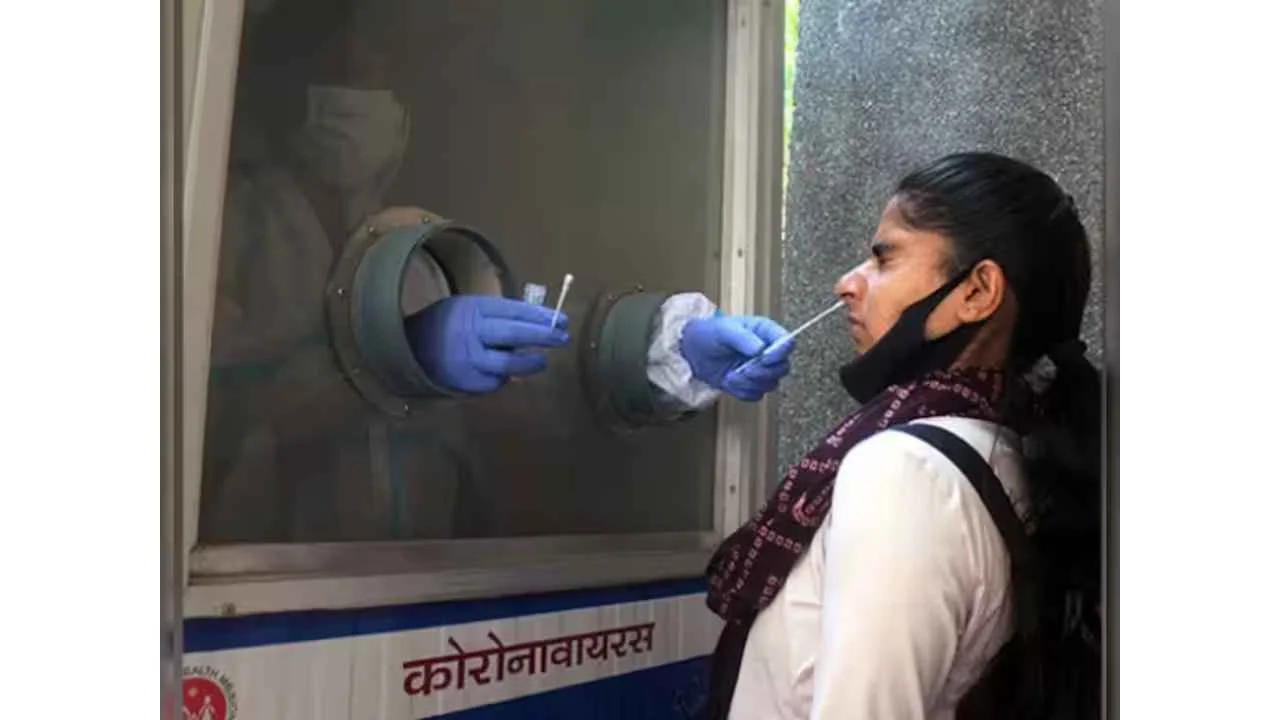
India recorded 605 fresh COVID-19 cases and four deaths in the last 24 hours. The active cases have increased to 4002, while India’s overall COVID case tally stands at over 4.5 crore (4,50,18,792). The death toll was recorded at 5,33,396 with four new deaths – two from Kerala and one each in Karnataka and Tripura – reported in the last 24 hours, the data updated at 8am stated.
The number of people who have recovered from the disease has gone up to 4,44,81,341, an increase of 648 since Sunday morning. In Kerala a 70 year-old male with chronic obstructive pulmonary disease (COPD) and 81year-old male with T2DM and HTN, and in Karnataka, a 48 year old male with CA and TB died, while one person in Tripura succumbed to COVID.
The Indian Council of Medical Research (ICMR) reported that 11,838 doses of the vaccine had been administered in the country till January 7. The data is a compilation of the Integrated Disease Surveillance Programme (National Centre for Disease Control), media bulletins and websites of various states at 8am on January 4.
As the winter season sets in, health experts are highlighting a sudden surge in viral infections, influenza, and COVID-19 cases. Dr Nikhil Modi, a senior pulmonologist at Indraprastha Apollo Hospital, pointed out that the decrease in temperature leads to increase in moisture in the air, low wind speed and also causes an increase in pollution levels. This contributes highly to various infections.
Due to the decrease in temperature the fog combines with the pollution in the air which further leads to the formation of smog. This condition of the atmosphere can cause different types of infections and difficulty in breathing. Both the state and the central government are keeping a close watch on the new Omicron Subvariant JN.1. J.N.1 is a Variant of Interest (VOI) which is under intense scientific scrutiny.
Health
India records 774 new Covid-19 cases, 2 deaths in 24 hours
The number of daily cases was in double digits till December 5 but it started to rise again amid cold weather conditions and after the emergence of new Covid-19 variant, JN.1.
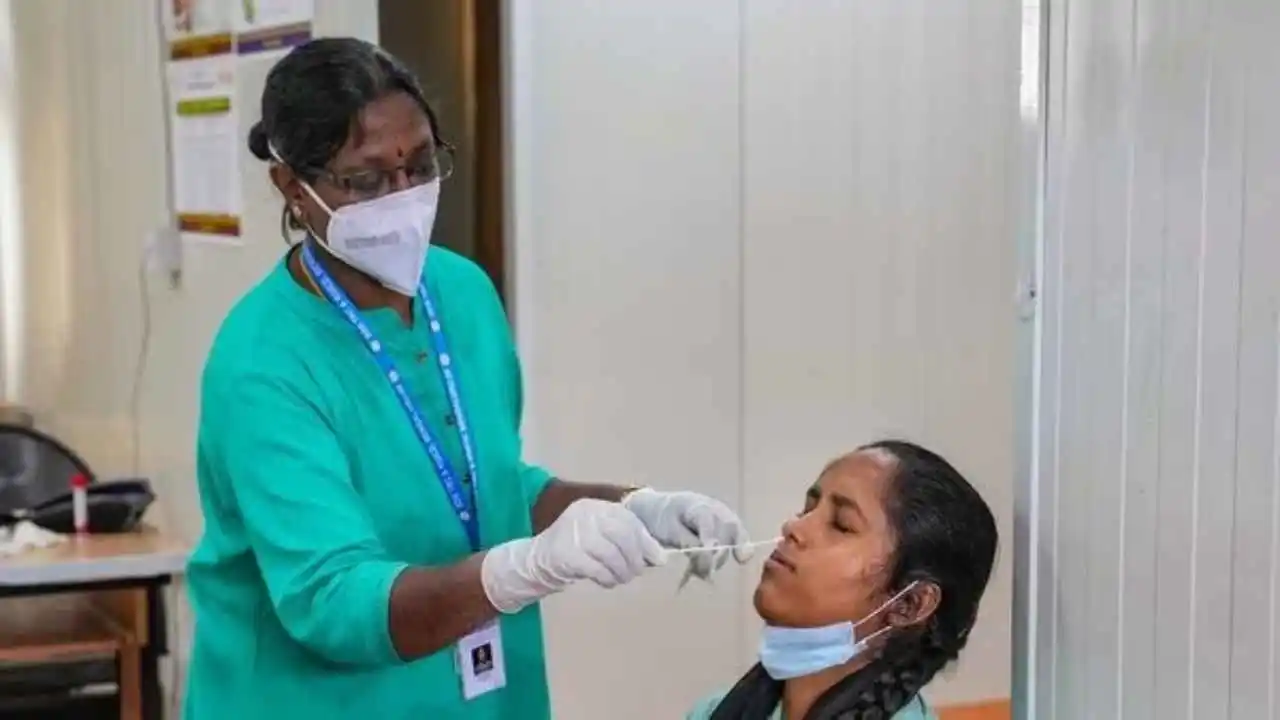
India on Saturday had a single-day rise of 774 Covid cases while the number of active cases stood at 4,187, the Union health ministry said. As many as two deaths – one each from Tamil Nadu and Gujarat were reported in a span of 24 hours. Of the 4,187 active cases, the majority (over 92%) are recovering under home isolation.
The number of daily cases was in double digits till December 5 but it started to rise again amid cold weather conditions and after the emergence of new Covid-19 variant, JN.1. The central government has asked the state government and union territories to maintain a constant vigil amid an upward trend in the number of Covid-cases and the detection of the JN.1 sub variant in the country.
According to reports after December 5, the highest single-day rise of 841 cases was reported on December 31, 2023, which was 0.2% of the peak cases reported in May 2021. A health official said that the JN.1 variant is neither leading to an exponential rise in new cases nor a surge in hospitalisation and mortality in the country.
The Karnataka government has made the Covid test mandatory for those with Influenza like illness (ILI) or Severe Acute Respiratory Illness (SARI). Karnataka Health Minister Dinesh Gundu Rao said more than 7000 tests are being done every day and the COVID positivity rate is 3.82%. The positivity rate in the state has not come down yet.
He said those with symptoms are being monitored and tested. Those who are in isolation at home have been told to take extra care. He added it is expected that the trend of decreasing Covid cases may start next week in Karnataka. India has witnessed three waves of Covid-19 in the past with the peak incidence of daily cases and deaths being reported during the Delta wave during April-June 2021. At its peak 4,14,188 cases and 3915 deaths were reported on May 7, 2021.
-

 Entertainment20 hours ago
Entertainment20 hours agoBollywood stars Vidya Balan, Kartik Aaryan, Pratik Gandhi, Ileana D’Cruz, Mouni Roy, Radhika Madan, Mrunal Thakur attend Do Aur Do Pyaar premiere
-
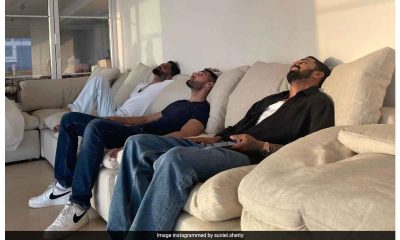
 Cricket news18 hours ago
Cricket news18 hours agoHappy Birthday KL Rahul: Suniel Shetty wishes son-in-law KL Rahul on his 32nd birthday
-
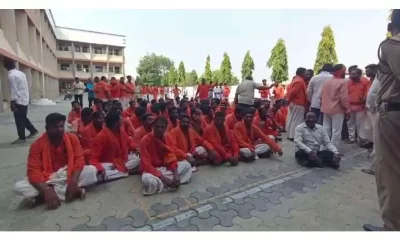
 India News22 hours ago
India News22 hours agoReligious outfit vandalises The Blessed Mother Teresa High School in Telangana after teachers object to students wearing Hanuman Deeksha dress
-

 India News23 hours ago
India News23 hours agoClashes erupt during Ram Navami procession in West Bengal’s Murshidabad district
-
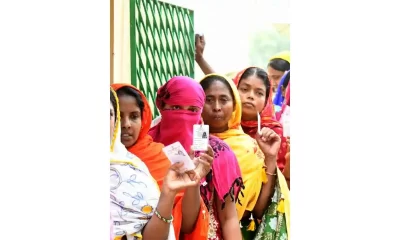
 2024 Lok Sabha Elections1 hour ago
2024 Lok Sabha Elections1 hour agoPrime Minister Narendra Modi urges citizens to vote in record numbers as voting for first phase of Lok Sabha elections begins on 102 seats across India
-

 India News17 hours ago
India News17 hours agoEnforcement Directorate seizes Shilpa Shetty’s husband Raj Kundra’s properties worth Rs 97 crore
-
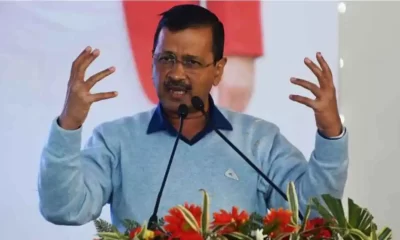
 India News16 hours ago
India News16 hours agoEnforcement Directorate says Arvind Kejriwal is deliberately eating mangoes, sweets, taking sugar with tea to increase his blood sugar level and create ground for bail
-

 2024 Lok Sabha Elections33 mins ago
2024 Lok Sabha Elections33 mins agoLok Sabha elections 2024: Google Doodle marks the start of polls with index finger voting symbol



